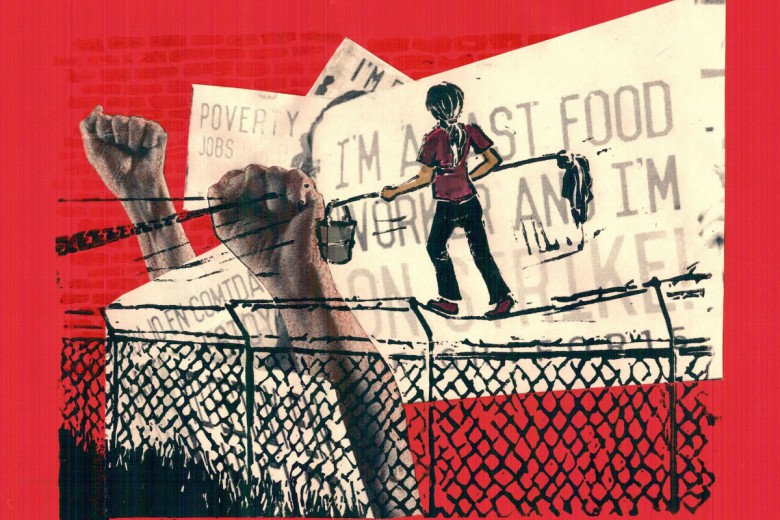It’s the summer of 1986. Think Top Gun and Glasnost and the depths of a renewed Cold War that the Eastern bloc is losing. Reagan is in the middle of his second term. Thatcher is set to win her third term. Socialist French President François Mitterrand has long since abandoned the radical program he was elected on in the face of capital flight, rising inflation, and economic sabotage. It is becoming very clear to some on the left that the rightward turn that began in the late 1970s across much of the West is no temporary setback or routine swinging of the political pendulum. The unions have been roundly beaten almost everywhere. With the postwar economic boom long gone bust, the balance of forces – political, economic, and industrial – are not in the left’s favour.
Amid the spreading demoralization, a paper appears in an academic journal that acknowledges the despair but aims to provide new hope. Abandon all aspirations of achieving socialism, a pair of Dutch and Belgian authors declare; it is an unnecessary detour anyway! Instead, look to what they call “A Capitalist Road to Communism.”
“Prospects for the Left look bleak indeed. Electoral disasters (on the British pattern) and policy U-turns (on the French pattern) have reinforced the suspicion that socialism may forever remain out of reach,” wrote Robert van der Veen and Philippe Van Parijs.
“[A]ctually existing socialist societies have repeatedly failed to provide an attractive picture of socialism,” they submitted. “Compounded by mounting disillusionment with the achievements of State intervention in the West, this failure has shaken many people’s faith in the very desirability of socialism.”
Van der Veen and Van Parijs argued that this state of affairs had to be accepted. Their pitch, nonetheless, was that the central principles of communism could be constructed inside of capitalism via the policy innovation of a guaranteed basic income, bypassing the need for the election of a socialist government, workers’ control of industry, central planning, or the elimination of private property, much less a socialist revolution.
“Capitalist Road” would prove to be a seminal paper, launching the modern discussion on the left of a basic income, meaning a modest sum “paid by a government, at a uniform level and at regular intervals, to each adult member of society … irrespective of whether the person is rich or poor, lives alone or with others, is willing to work or not.”
The key selling point to a basic income for Van Parijs, van der Veen, and contemporary leftist champions of the concept is that it undermines the necessity of work, eliminating the need to sell your labour to a boss in order to survive.
Fearing social unrest due to massive permanent unemployment, today there are leading capitalists who share in the renewed enthusiasm for basic income policy.
In August, Citigroup chief economist Willem Buiter issued a report discussing growing inequality and “robot angst” as automation supposedly supplants workers. Key to avoiding the danger of a “bifurcating” world, Buiter says, is “a guaranteed minimum income for all, or an ambitious negative income tax … to support those left behind by technological advance.”
Editorialists in the Financial Times and the free-market Economist have backed or flirted with some form of basic income, as have centre-left economists like Robert Reich and Paul Krugman. The UK’s Green party put basic income policy at the forefront of its spring election campaign, cost out to an eye-watering £331 billion but made revenue-neutral via the abolition of a raft of welfare provisions including child benefits. The new leader of the Labour party, Jeremy Corbyn, views the idea favourably, and there are basic income pilot projects moving ahead in Switzerland, Finland, and the Netherlands. This fall, the New Democratic opposition in Saskatchewan called for a guaranteed basic income pilot project.
Basic income policy is having its moment.
Manitoba’s MINCOME experiment
The current scale of the consensus on the idea is a far cry from the long-buried experiment in the rural Manitoba town of Dauphin in the 1970s, a comprehensive, five-year trial that is still cited by advocates as the strongest proof yet that it works as a poverty reduction strategy. The experiment, known as MINCOME, was jointly bankrolled by the then-provincial New Democratic government and Pierre Trudeau’s Liberals, and offered an unconditional annual income to every family. Those who worked had their MINCOME cut by 50 cents for every dollar earned.
The idea was to offer a cushion for shifting crop prices or crop failures. The governments were interested to see whether such support would produce a disincentive to work, creating a town of layabouts. If the plan was successful, though, the long game was to roll out a similar program nationwide. The tab for the scheme ended up being $17 million, much more than had been envisaged. MINCOME was scrapped as a recession hit Canada at end of the decade. Almost 1,800 boxes worth of data on the trial were packed away, not to be publicized again until University of Manitoba health sciences professor Evelyn Forget brought their existence to light in 2009.
She found that there was essentially no reduction in working hours under the scheme, with two notable exceptions: women who were mothers of young children or providing home care for elderly or disabled relatives; and teenagers, who now felt free to continue in school and not help out their parents on the farm. Meanwhile, there were fewer workplace injuries, fewer car accidents, less domestic abuse, and hospital visits declined by 8.5 per cent.
Despite the quiet disappearance of MINCOME, there has long remained a buzz about basic income policy in the Liberal Party. Even before MINCOME, Pierre Trudeau came close to embracing a 1971 parliamentary report recommending a guaranteed annual income, and the concept made a brief reappearance in 1994 in a discussion paper from then-Liberal Prime Minister Jean Chretien’s administration. And here we begin to see why many in this centrist party are fond of the idea. The paper declared, “the social security system is not working for many Canadians and for the country as a whole,” and suggested it be redesigned as a Guaranteed Annual Income (GAI). The overhaul would be part of a wider transformation of federal social programs and provincial transfers.
The overhaul – a decade of unprecedented cuts to the Canadian welfare state – arrived on time, but the basic income never did. Then, last year, the Liberals of Justin Trudeau, battered on their left flank by an increasingly popular New Democratic Party, adopted a Basic Annual Income as a “priority resolution.”
Red Tories and libertarians
Hugh Segal, the Red Tory intellectual and one-time chief of staff to Prime Minister Mulroney, has come out firmly in favour of a universal basic income, and is now perhaps its biggest proponent in the country. Identifying as a “One Nation” conservative – a rare breed in Canada these days – he keeps his distance from Thatcherite politics, insisting instead upon the obligations of the better off toward the poor, all the while emphasizing social harmony between the classes. This preference for social harmony rather than class struggle runs through many of the arguments in favour of a basic income.
Segal says he wants to see a GAI because decades of existing welfare policy have made no dent in poverty rates in Canada. In a piece titled “Scrapping Welfare” in the Literary Review of Canada, he writes: “We spend billions on programs that address dropouts, reduce substance abuse, assist young people in trouble with the law, encourage nutrition, subsidize housing, provide safe houses for the victims of family violence, run the Children’s Aid, realign incentives in the tax system for the working poor, support First Nations education and fund micro-managing welfare systems that do not bring anyone above the poverty line.”
All this would be done away with in favour of a simple monthly sum deposited in a person’s bank account. Poor people would no longer be caseload burdens borne by “well-paid and unionized civil servants,” as he puts it. “They would not have to apply through Plexiglas for enough money to feed their kids.” They would no longer be badgered by petty rules and case officer interference in their lives, “treated as dim creatures, incapable of making decisions.” They would be citizens instead, trusted to make their own life choices. The argument is seductive.
By his assessment, the cost of the program delivering a base income floor of $10,000 a year to 3 million low-income Canadians, even before taking into account the significant savings from the health-care system, prisons, and the forgone welfare payments, would be $30 billion.
Although Segal sees a basic income as a way to streamline existing social welfare programs and employment insurance into one universal system, he doesn’t go so far as to say that a basic income should replace the whole welfare state. A guaranteed income would just become another pillar alongside universal education and health care.
This is not true for the libertarian wunderkinds and venture capitalists of Silicon Valley, however, who have fallen in lust with the idea of basic income as a “bureaucracy killer.” U.S. libertarians go beyond Segal’s vision to include eliminating what remains of Medicaid, public education, and basically the entire public sector except for police, courts, and the armed forces. The millions on today’s welfare rolls will be liberated to become entrepreneurs, bootstrapping their basic income into affluence.
Neoclassical economist and libertarian hero Milton Friedman advocated a version of the idea as long ago as the 1960s: a negative income tax, in which below a certain income level, people receive a stipend from the government instead of paying taxes. Richard Nixon wanted to implement such a plan but it ran into administrative, cost, and conceptual problems that ultimately sank it. Sam Bowman of the British free-market Adam Smith Institute says: “The ideal welfare system is a basic income.” And last year, the libertarian Cato Institute published a series of essays discussing variations on the theme of a guaranteed income. Recognizing that the wider populace isn’t about to go full libertarian anytime soon, these theorists view basic income as a stepping stone to eradicating the welfare state – a libertarian version of what socialists used to call a “transitional program.”
In Finland, it is a centre-right/hard-right coalition government that will be overseeing basic income pilot efforts, with an explicit aim to provide an alternative to the country’s expensive benefits system. Historically in Finland, the Social Democratic Party and the Central Organisation of Finnish Trade Unions (SAK) have strongly opposed a basic income, viewing it as an attack on social security and collective bargaining.
Following the capitulation of Alexis Tsipras’s Syriza government to the EU troika in July, Greece’s new bailout agreement with creditors includes a plan for the national rollout of a guaranteed minimum income (GMI) by the end of 2016.
Many trade unionists view the GMI as another effort by eurozone technocrats to radically curtail social provisions and slash union wages.
Armine Yalnizyan, senior economist with the Canadian Centre for Policy Alternatives, a progressive think tank, is likewise not a fan. She notes that while Segal’s back-of-the-envelope figure came to $30 billion, a more realistic sum from Simon Fraser University economist Jonathan Rhys Kesselman put it at $350 billion. “This equals a huge opportunity cost,” she says. “Even if you got back some of that money, as Senator Segal says would be the case, by scrapping programs, the poor could be even worse off, depending on which group of poor.”
This is a huge amount of money that could be spent on child care, transport infrastructure, improving public education, and decommodifying higher education. Above all, some of this could be spent on building more housing to bring down the cost of rent. “The single biggest bite out of our incomes, irrespective of income, is shelter costs,” she continues. The current housing market is so distorted that even a generous basic income will do little to correct this problem. And the problem is getting worse, especially in the big cities. “If you don’t have solid rent controls in place or a much bigger stock of (high quality) low-rent housing, the money goes into one pocket and out the other – a taxpayer transfer to landlords.”
Kesselman, for his part, concedes that a paternalistic welfare bureaucracy is “pernicious” in its distinctions between worthy and unworthy recipients of cash and programs. But welfare programs don’t have to stay as they are, he says, and could be made less authoritarian. He points out that most of these variegated social programs – not just the obvious ones like health care and education, but also long-term care facilities, pharmaceutical subsidies, mental health services, drug and alcohol rehabilitation, immigrant resettlement, prenatal counselling, school breakfasts, sporting facilities, and legal aid, to name just a handful of examples – do need to be funded and managed separately. They would suffer or disappear if they were replaced by a single lump sum allocated to individuals each month.
“Taking even modest initial steps toward a guaranteed income is likely to further starve critically needed targeted cash transfers and diverse in-kind benefits,” he concludes.
In an interview for Salon, John Schmitt, a senior research associate with the progressive Center for Economic and Policy Research in Washington, D.C., says, “My fear is that it’s possible for a coalition of completely well-intentioned and idealistic – with no negative connotation to that – people on the left to support what would be a very generous basic guaranteed income, in a coalition with significant elements on the right, including the libertarian right, that has basically the motivation that this will undermine existing social welfare institutions.”
But what about a basic income that existed in addition to existing programs and not in place of them? A generous basic income instead of a miserly one? Could this be the next step in the welfare state, or even, as Van Parijs puts it, “the culmination of the welfare state”?
Everything depends on the balance of forces between capital and labour. If labour is weak, then the likelihood is that a basic income will be meagre and conditional while ushering in the full-scale privatization of public services. If labour is strong, a basic income could be unconditional, generous, and an addition to existing programs.
It was precisely the historic defeat of the working class in the 1970s and ’80s that led Van Parijs to his pessimistic conclusion that it would be better to push for a universal grant than to cling to the old socialist vision of a system of democratic economic planning, where workers own the means of production, or even the more moderate (but no less shattered) Keynesian dream of full employment.
While left-wing proponents believe a basic income will strengthen the hand of labour, right-wing proponents back it for exactly the opposite reason. Libertarian economics commentator Steve Randy Waldman argues: “Supplementary incomes are a cleaner way of increasing labour bargaining power than unionization. Unionization forces collective bargaining, which leads to one-size-fits-all work rules and inflexible hiring, firing, and promotion policies, in addition to higher wages.”
Here, basic income is not only a subsidy to employers; it is a union-buster.
After all, why would any contemporary government, as beholden to global capital as governments are today, introduce policy that would strengthen the hand of labour?
If labour had the strength to enforce the introduction of a good basic income, it would also have the strength to revive the project of full employment. And while even the best basic income policy only sets a floor below which poverty cannot fall, full employment strengthens labour’s hand to demand ever-greater wages.
The unemployment we see today is not primarily caused by technology but is a deliberate product of fiscal and monetary policies introduced in the 1970s and 1980s, intended to discipline labour after the abandonment of the full-employment strategies of the previous three decades that had produced stagflation, a declining share of national income going to the capitalist class, and – worst of all for the rich and powerful – militant unions.
Van der Veen and Van Parijs devised their capitalist road to communism in the mid-1980s as a shortcut to less poverty and more leisure time amid the defeat of organized labour and the political left. Thirty years later, do we still expect governments to offer up these policy outcomes in the absence of a robust and militant labour movement?
Basic income schemes have travelled from the arcane corners of left-wing thought to prominence today only after the realization that not merely socialism but also Keynesianism has been defeated, at least at the level of the nation-state (even the federal NDP pledges balanced budgets and low taxes). In this context, Marxist sociologist Göran Therborn castigates basic income policy as a “curious utopia of resignation.”
There will be no capitalist road to communism. There is only, as ever, the calibre of organized labour’s militancy and power.







